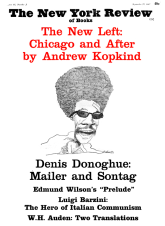To the Editors:
On September 17, the Board of Governors of State Colleges and Universities of Illinois will very likely reconsider the case of Staughton Lynd—a case, we believe, that raises issues of national importance. In July, the Board rejected the appointment of Lynd as associate professor of history by Chicago State College, even though the appointment was unanimously recommended by the department of history and the president of the college.
The Board explicitly based its decision on political grounds. It did “not question Dr. Lynd’s ability as a scholar and as a teacher of history.” Instead it held that his “public activities”—his advocacy of “nonviolent civil disobedience” and his trip to Hanoi in 1965-66—“go beyond mere dissent.”
So far this case has attracted very little attention outside Illinois, but we are confident that many readers will agree with us that the Board’s action represents a particularly flagrant invasion of academic freedom. As such, it concerns everyone who values the right of dissent. We hope that readers of this letter, singly or in groups, will communicate with the Board at Springfield, Illinois, urging upon them the principle that a man’s political views cannot be permitted to override the professional judgement of his peers. A concerted expression of public concern, both within the academic community and without, will help to discourage such decisions in the future, both in Illinois and elsewhere.
Professors at a dozen private and public universities have formed a Committee for Academic Freedom in Illinois, which is attempting to publicize the case and to support Professor Lynd’s lawsuit against the Board. Individuals who would like to sign the committee’s statement of principles and contribute to a fund for legal defense are urged to communicate with one of the co-chairmen of the committee who have signed this letter.
Christopher Lasch
Northwestern University
Evanston, Illinois
Alfred F. Young
Northern Illinois University
DeKalb, Illinois
This Issue
September 28, 1967



